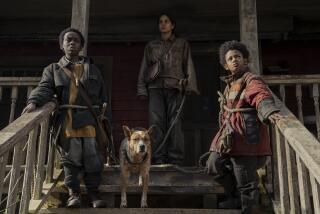‘Green Room’ director Jeremy Saulnier probes a primal impulse in chilling Alaska-set adaptation ‘Hold the Dark’

Jeffrey Wright, Alexander Skarsgård, Riley Keough and director Jeremy Saulnier discuss going on location for their Alaskan wilderness Netflix drama “Hold the Dark.” Says Wright in the Los Angeles Times 2018 TIFF Studio, “You can’t re-create this on
Macon Blair was playing a skinhead in “Green Room” for frequent collaborator Jeremy Saulnier when he picked up William Giraldi’s 2014 novel, “Hold the Dark,” and devoured it in two sittings.
The tale of a naturalist summoned to a remote Alaskan village to track down child-murdering wolves was an “emotional gut-punch,” says Blair, who starred in Saulnier’s 2007 debut, “Murder Party,” and 2013 breakout, “Blue Ruin.” The longtime friends teamed up to adapt the story and secured Giraldi’s blessing, promising not to “sand off the edges” of the novel and turn it into a big action movie.
The resulting psychological thriller, adapted by Blair and streaming now on Netflix, is unflinching in its horrors as it illuminates the dark corners that reside within the souls of Giraldi’s cast of characters. It is Saulnier’s most ambitious work yet in scope and tone, a film that darts away from providing too many answers. For those, you can read the book.
“There’s a lot more material in the book, and some things that take place inside some of the characters’ heads,” Blair explained by phone from his home in Austin, Texas. “In the movie we deliberately tried to scale some of that back.”
“The tone of the whole thing was dependent on people not being totally sure of what was going on,” he added, “and telepathically picking up on the things that were going on.”
Filming in freezing temperatures among the snowscapes of the Canadian Rockies (standing in for northern Alaska) added a bone chill that leaps off the screen with visceral atmospheric force, bringing the novel, set within a community seemingly on the edge of the world, to life.
But in cinematic form, Giraldi’s story begged a slightly different narrative structure. In contrast to the book’s fractured multistrand narrative, the film focuses primarily on the perspective of a single character, observer Russell Core, the outsider who bears witness to the mystery that unfolds.
“There’s wonderful symbolism in the film, very subtle but very specifically layered into this journey,” said Jeffrey Wright (“Westworld”), who plays Core, during a visit to the L.A. Times studio at the Toronto International Film Festival, where “Hold the Dark” premiered.
“Hitting notes in the right way so that they’re legitimate and organic, but also reflect that symbolism, was a little bit of a challenge. That, and walking in the wrong snowshoes,” he laughed.
His grizzled character begins a snow-blanketed, blood-spattered odyssey when he is summoned to the fictional northern Alaskan hamlet of Keelut by a distraught woman named Medora Slone (Riley Keough), who tasks him with tracking down the wild wolves that took her young son before her soldier husband, Vernon Slone (Alexander Skarsgard) returns home.
There in Keelut, a rash of child disappearances in the predominantly indigenous community have left a cloud of grief hanging in the air, along with the specter of local customs and beliefs bewildering to Core’s outsider eyes.
It’s not just the focus on Core that sets the film apart from the book; in casting Wright, the character became African American — adding a subtle new layer that draws attention to the invisible lines that divide the insular community of Keelut, where longstanding frictions simmer between native Alaskan villagers and a predominantly white local police force.
Review: Brooding thriller ‘Hold the Dark’ will chill you to the bone »
Core was written in the screenplay with his emotional qualities in mind, leaving the ethnicity of the character unspecified. “In the script it was more like, ‘Salt beard, he’s very tired,’” said Blair, adding that Wright was simply perfect for the role of Core, whose understanding of wolves makes him uniquely attuned to the behavior of humans living on the fringes of traditional society.
He is quietly present, ever-reaching for an understanding that lies just beyond his grasp, as a terrible discovery sets off an even more devastating chain of events involving the Slones, local cop Donald Marium (James Badge Dale) and Vernon’s childhood friend Cheeon (Julian Black Antelope).
“On the surface of things, these characters are doing things that you could very easily classify as evil, or wrong, or bad, and they certainly are those things and they’re causing great damage. There was something [in the book] that was kind of removed from that, while keeping the horror of all of that violence intact,” said Blair. “It was not judgmental somehow.”
Keough, tasked with the challenge of bringing one of the film’s more enigmatic characters to life — Medora Slone, a mother lost in her grief and haunted by unseen forces — echoed the sentiment.
“The most difficult thing for me [was] just being in the head space of somebody that’s gone through what she’s gone through and also figuring out who she is and caring for her,” she said.
Keeping the film grounded in the present, Blair and Saulnier chose to maintain ambiguity around certain characters’ backstories. Specifically, they decided not to make explicit one of the book’s more explosive reveals regarding the motivations and backgrounds of two key characters, although Blair says it’s there onscreen for those who seek it.
“There can be a mystical reason, there can be a sociological reason [for what they do] – however people want to interpret it is cool,” said Blair, who also pops up in a small but memorable role.
For genre favorite Saulnier, who’s made a name out of probing the human impulses behind brutality and revenge, the film marks his most ambitious undertaking yet after a pair of acclaimed smaller films — “Blue Ruin,” in which a man exacts intimate retribution for his parents’ murders, and “Green Room,” in which a punk band battles their way out of a neo-Nazi compound.
“Hold the Dark” “is a lot of atmospheric storytelling,” Saulnier explained. “It’s deeply layered, it has a mytho-poetic vibe to it that was something I hadn’t tackled before. It is the most intimate film I’ve ever done but also expands on the level of mayhem and violence.”
That violence — punctuated in a series of striking scenes, including a Peckinpah-esque standoff set piece that tears its way through a battalion of bodies and rattles with Saulnier’s signature visceral intensity — explodes when Vernon Slone, an outsider in unspoken ways within his own community, returns from the Iraq War driven by grief, seeking his own version of justice.
That storyline took Saulnier and his crew from the sub-zero Canadian winter to the crushing heat of the Moroccan desert for scenes depicting Slone’s deployment to Iraq, where he stalks the desert with the same apex predator menace he moves with through the icy darkness back home.
“In a way, Vernon Slone exists in a vacuum; it doesn’t really matter where he is,” Skarsgard said of his character. “Often as an actor you try to find an arc, a cause and effect, and it was scary to avoid that here: I wanted him to cut through the story and just be Vernon Slone the whole time, to not change too much.”
“Slone is not governed by our laws or our codes; he is just there,” said Saulnier. “He has his own code which he operates by… he’s not fighting anyone’s war but his.”
“I didn’t want to over-explain it to myself even. I wanted him from the first scene to the last to be an arrow in a way,” added Skarsgard.
He too was taken by Giraldi’s source material. “If you haven’t read the novel, read it. It’s exceptional,” he said, noting with a smile that uninitiated viewers may want to wait until they see the film to dive into the novel. “Read it after.”
More to Read
Only good movies
Get the Indie Focus newsletter, Mark Olsen's weekly guide to the world of cinema.
You may occasionally receive promotional content from the Los Angeles Times.











